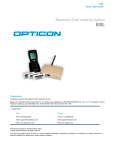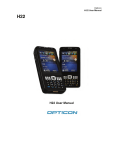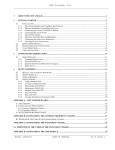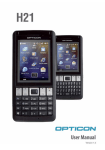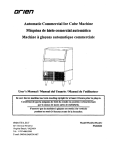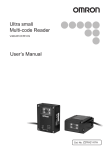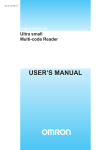Download OPI-4002 Specification Manual
Transcript
2D Barcode Scanner OPI 4002 The OPI 4002 is a 2D barcode scanner that •provides wireless communication compliant with IEEE 802.15.4 between the OPI 4002 and a host system. Specifications Manual Opticon OPI 4002 Specifications Manual All information subject to change without notice. Document History Model Number: OPI 2002 Specification Number: SS06077 Edition: 1A Original Spec Number: SS06076 Date: 2006-12-22 Copyright 2006 Opticon. All rights reserved. This manual may not, in whole or in part, be copied, photocopied, reproduced, translated or converted to any electronic or machine readable form without prior written consent of Opticon. Limited Warranty and Disclaimers PLEASE READ THIS MANUAL CAREFULLY BEFORE INSTALLING OR USING THE PRODUCT. Serial Number A serial number appears on all Opticon products. This official registration number is directly related to the device purchased. Do not remove the serial number from your Opticon device. Removing the serial number voids the warranty. Warranty Unless otherwise agreed in a written contract, all Opticon products are warranted against defects in materials and workmanship for two years after purchase. Opticon will repair or, at its option, replace products that are defective in materials or workmanship with proper use during the warranty period. Opticon is not liable for damages caused by modifications made by a customer. In such cases, standard repair charges will apply. If a product is returned under warranty and no defect is found, standard repair charges will apply. Opticon assumes no liability for any direct, indirect, consequential or incidental damages arising out of use or inability to use both the hardware and software, even if Opticon has been informed about the possibility of such damages. Packaging The packing materials are recyclable. We recommend that you save all packing material to use should you need to transport your scanner or send it for service. Damage caused by improper packaging during shipment is not covered by the warranty. Trademarks Trademarks used are the property of their respective owners. Opticon Inc. and Opticon Sensors Europe B.V. are wholly owned subsidiaries of OPTOELECTRONICS Co., Ltd., 12-17, Tsukagoshi 4-chome, Warabi-shi, Saitama, Japan 335-0002. TEL +81-(0) 48-446-1183; FAX +81-(0) 48-446-1184 SUPPORT USA Europe Phone: 800-636-0090 Email: [email protected] Email: [email protected] Web: www.opticonusa.com Web: www.opticon.com 2 Opticon OPI 4002 Specifications Manual Contents 1. Abstract ........................................................................................................................................ 6 2. Overview ...................................................................................................................................... 6 3. Physical Features ........................................................................................................................ 7 3.1. Dimensions .......................................................................................................................... 7 3.2. Weight .................................................................................................................................. 7 3.3. Color .................................................................................................................................... 7 4. Environmental Specifications .................................................................................................... 7 4.1. Operating Temperature and Humidity .................................................................................. 7 4.2. Storage Temperature and Humidity ..................................................................................... 7 4.3. Ambient Light Immunity ....................................................................................................... 8 5. Electrical Specifications ............................................................................................................. 8 5.1. Main Battery ......................................................................................................................... 8 5.2. Battery Operating Time and Charging Time ........................................................................ 8 5.3. AC Adaptor .......................................................................................................................... 9 5.4. Operating Indicators ............................................................................................................. 9 5.4.1. LED Indicator and Buzzer ......................................................................................................... 9 6. Optical Specifications ............................................................................................................... 10 6.1. Imager Scanning ................................................................................................................ 10 7. Technical Specifications........................................................................................................... 10 7.1. Test Samples: 1D Symbologies ......................................................................................... 11 7.2. Test Samples: 2D Symbologies ......................................................................................... 11 7.3. Print Contrast Signal (PCS) ............................................................................................... 12 7.4. Minimum Resolution .......................................................................................................... 12 7.5. Scan Area and Resolution ................................................................................................. 13 7.5.1. Depth of Field ......................................................................................................................... 13 7.6. Pitch, Skew, and Tilt .......................................................................................................... 14 7.7. Curvature ........................................................................................................................... 15 8. Aiming ........................................................................................................................................ 16 8.1. Aiming Patterns .................................................................................................................. 16 8.2. Aiming Guidelines .............................................................................................................. 16 9. Interface Specifications ............................................................................................................ 17 9.1. Wireless Interface .............................................................................................................. 17 3 Opticon OPI 4002 Specifications Manual 9.2. IEEE 802.15.4 .................................................................................................................... 17 9.2.1. Radio Equipment .................................................................................................................... 17 9.2.2. Frequency Band ..................................................................................................................... 17 10. Default Settings ......................................................................................................................... 18 10.1. Set Default Interface .......................................................................................................... 18 10.1.1. Default Settings ...................................................................................................................... 18 10.2. Configuring Settings by Reading Menu Barcode Labels ................................................... 18 10.2.1. Address Registration to Connect with OPA 1001 ................................................................... 18 10.2.2. Wireless Communication Channel Settings: CH11–CH26 ..................................................... 18 10.2.3. Data Memorizing Settings Outside the Communication Range: DTME/DTMD ...................... 18 10.3. Default Settings 1: Readable Codes .................................................................................. 19 10.4. Default Settings 2: Read Options, Trigger, Buzzer ............................................................ 20 10.5. Default Settings 3: Other Communication Settings ............................................................ 21 11. Serial Number and Labeling ..................................................................................................... 21 11.1. FCC Label .......................................................................................................................... 21 12. Packaging Specifications ......................................................................................................... 22 12.1. Collective Packaging Specification .................................................................................... 23 13. Durability .................................................................................................................................... 24 13.1. Electrical Noise .................................................................................................................. 24 13.2. Static Electricity .................................................................................................................. 24 13.3. Shock ................................................................................................................................. 24 13.3.1. Drop Test (without packaging) ................................................................................................ 24 13.3.2. Drop Test (with individual packaging) ..................................................................................... 24 13.4. Vibration Strength .............................................................................................................. 24 13.5. Dust and Drip Proof ........................................................................................................... 25 14. Reliability.................................................................................................................................... 25 15. Regulatory Compliance ............................................................................................................ 26 15.1. LED Safety ......................................................................................................................... 26 15.2. Product Safety ................................................................................................................... 26 15.3. EMC ................................................................................................................................... 26 15.4. RoHS ................................................................................................................................. 26 15.5. R&TTE ............................................................................................................................... 26 15.6. Radio Law .......................................................................................................................... 27 15.7. State of California: Perchlorate Best Management Practices ............................................ 27 4 Opticon OPI 4002 Specifications Manual 16. Safety .......................................................................................................................................... 28 16.1. Shock ................................................................................................................................. 28 16.2. Temperature Conditions .................................................................................................... 28 16.3. Foreign Materials ............................................................................................................... 28 16.4. Other .................................................................................................................................. 28 16.5. AC/DC Adapter .................................................................................................................. 28 17. Mechanical Drawing .................................................................................................................. 29 Table of Figures Figure 1: Depth of field ................................................................................................................ 13 Figure 2: Pitch, skew, and tilt....................................................................................................... 14 Figure 3: Curvature...................................................................................................................... 15 Figure 4: Aiming patterns ............................................................................................................ 16 Figure 5: Serial number diagram ................................................................................................. 21 Figure 6: FCC label ..................................................................................................................... 21 Figure 7: Individual packaging ..................................................................................................... 22 Figure 8: Collective packaging .................................................................................................... 23 Figure 9: Mechanical drawing ..................................................................................................... 29 5 Opticon OPI 4002 Specifications Manual 1. Abstract This manual provides master specifications for the OPI 4002 2D barcode scanner (hereafter referred to as “scanner”). 2. Overview The OPI 4002 includes the following features: • A 1.3 million-pixel (SXGA) CMOS area image sensor, and a compact camera module with wide-angle lens that enables scanning of wider symbologies at higher resolution • Wide-angle lens optics that make it possible to scan wider symbologies at closer distances • A small, high-performance, power-saving decoder that processes data faster and provides smoother scanning of both linear (1D) and 2D symbologies • Wireless communication compliant with IEEE 802.15.4 (an interface standard for ZigBee physical layer and MAC layer) is the interface between the OPI 4002 and a host system • The scanner is supplied with an IEEE 802.15.4 dongle to establish wireless communication through the USB port of hosting hardware. • Scanner settings can be configured by scanning menu labels. • A lithium-ion secondary battery is used as the power supply for the scanner. • Connect a dedicated AC adapter or an optional charger directly to the OPI 4002 to charge the battery. • The OPI 4002 complies with the Restriction of Hazardous Substances (RoHS). 6 Opticon OPI 4002 Specifications Manual Supported symbologies: Linear (1D) Postal Code 2D JAN/UPC/EAN, incl. add-on Chinese Post Aztec Code Codabar/NW-7 Korean Postal Authority Code Aztec Runes Code 39 Composite Codes Code 93 Data Matrix (ECC 0-140, ECC200) Code 128 Maxi Code (mode 2~5) GS1-128 (EAN-128) MicroPDF417 GS1 Databar (RSS) Micro QR Code IATA PDF417 Industrial 2of5 QR Code Interleaved 2of5 ISBN-ISSN-ISMN Matrix2of5 MSI/Plessey S-Code Telepen Tri-Optic UK/Plessey 3. Physical Features 3.1. Dimensions W 58.1 mm x D 42.4 mm x H 163.9 mm 3.2. Weight 125 grams, max. 3.3. Color Light gray 4. Environmental Specifications 4.1. Operating Temperature and Humidity Temperature: 0 to 40° C Humidity: 5 to 90% RH 4.2. Storage Temperature and Humidity Temperature: -20 to 60° C Humidity: 5 to 90% RH 7 Opticon OPI 4002 Specifications Manual 4.3. Ambient Light Immunity Decoding performance is guaranteed when the range of illumination on a barcode surface is between zero and the following values: Incandescent light to 10,000 lx Fluorescent light to 10,000 lx Sunlight to 100,000 lx Direct light or specular reflection from a light source should be prevented from entering the acceptance area. 5. Electrical Specifications 5.1. Main Battery The main battery is a lithium-ion secondary battery. Nominal capacity: 1100 mAh Nominal voltage: 3.6 V Item Consumption current Specifications Conditions 15 mA (max.) When idle 250 mA (max.) When scanning 550 mA (typ.) When charging 5.2. Battery Operating Time and Charging Time Items Specifications Conditions Battery life 30 hours (min.) 1 scan / 5 s Discharge and charge 300 times Battery capacity 70% (1C charging) Charging time 3 hours Time necessary to fully charge an empty battery Note: Battery life may be shorter than specified above when the quality of the battery pack is degraded. Conditions Ambient temperature: +25° Symbology: 1-digit Code 39, PCS = 0.9, Resolution = 1.0 mm Distance: 85 mm from the front edge of the scanner. (Single read) 8 Opticon OPI 4002 Specifications Manual 5.3. AC Adaptor The OPI 4002 can be charged by an optional AC adapter of 6.0 V / 750 mA. This optional adapter is used for charging the internal battery. Conditions Connect 1Ω resistance to a power supply line in series and measure the current by the voltage between both ends of resistance. Power supply voltage is measured at a connector terminal area. The current value depends on the interface type and host computer to which the device is connected. 5.4. Operating Indicators 5.4.1. LED Indicator and Buzzer The OPI 4002 uses LEDs and a buzzer to indicate its status. State Color Display Operating State Buzzer Red Lighting Shows that the scanner is being charged. - Green Lighting The light changes from red to green when charging is completed. - Green Blinking Shows that the scan or transmission was executed normally. Trrr Red Blinking Shows that the data could not be transmitted. Pip, Pip, Pip Orange Blinking Shows that the data is being stored in memory. Trrrrrrrrrrr Green Lighting Red Lighting Charging Scanning Shows that registration was completed. Wireless Connection Peeeeeeeeep (Completion of Registration) Shows that registration failed. 9 Pip, Pip, Pip Opticon OPI 4002 Specifications Manual 6. Optical Specifications 6.1. Imager Scanning Parameter Specification Unit Scanning method CMOS area sensor (black and white) — Effective pixels 1280 (H) x 1024 (V) dots Frame rate 30 fps Aiming LED wavelength (2 green LEDs) 527 nm Lighting LED wavelength (4 red LEDs) 630 nm View angle Horizontal: 47 Vertical: 37.5 ° Focal length 85 mm Notes: Refer to chapter 7, “Technical Specifications,” to read about scanning performance. 7. Technical Specifications The conditions for technical specifications are as follows, unless otherwise specified in each section. Conditions Ambient temperature and humidity: Room temperature (5 to 35º C) Room humidity (45% to 85% RH) Ambient light: 1000 to 1500 lx (on the surface of a barcode) Light source: 3-wavelength inverter fluorescent light Angles: α = 0°, β = +15°, γ = 0° Curvature R=∞ Background: Barcode = black Space = white Margin = white Background of label = black Power supply voltage: 3.6 V Decoding test: Approve the performance when decoding is successful in 70% or more of the tests 10 Opticon OPI 4002 Specifications Manual 7.1. Test Samples: 1D Symbologies The size of barcodes does not include quiet zones. 1D Barcode Resolution Symbology PCS Size (mm) Digits 0.254 mm Code 39 0.9 14 x 10 2 0.1 mm Code 39 0.9 11 x 10 4 0.26 mm 13-digit JAN 0.9 25 x 19 13 0.26 mm 8-digit JAN 0.9 17.5 x 15.5 8 Barcode samples with 0.127 mm and 0.26 mm resolution are OPTOELECTRONICS test samples. Other charts are printed by a regular printer. N/W Ratio: 1:2.5 Angle: α = 0°, β = 15°, γ = 0° Curvature R=∞ 7.2. Test Samples: 2D Symbologies PDF417 Resolution Error Correction PCS Size (mm) Characters 0.127 mm Level-4 0.9 13 x 8 17 0.254 mm Level-4 0.9 26 x 16.5 17 0.339 mm Level-4 0.9 35 x 22 17 Charts are printed by a regular printer. Horizontal to vertical ratio is 3:1 Data Matrix Resolution Model PCS Size (mm) Characters 0.169 mm ECC200 0.9 4x4 40 0.339 mm ECC200 0.9 8x8 40 Resolution Model PCS Size (mm) Characters 0.169 mm M 0.9 5x5 44 0.339 mm M 0.9 10 x 10 44 QR Code 11 Opticon OPI 4002 Specifications Manual 7.3. Print Contrast Signal (PCS) 0.45 or higher (over 70% of reflectivity of space and quiet zone). PCS= Reflectance of white bar‐Reflectance of black bar Reflectance of white bar Scanning performance may decline if dirt or scratches mar the optical window. Keep the optical window clean. 7.4. Minimum Resolution Resolution Symbology 0.1 mm Code 39 0.127 mm PDF417 0.169 mm QRCode 0.169 mm Data Matrix 12 Opticon OPI 4002 Specifications Manual 7.5. Scan Area and Resolution 7.5.1. Depth of Field The depth of field is measured from the edge of the optical window. Figure 1: Depth of field Symbology Resolution (mm) Decode Depth (mm) PCS Code 39 0.1 0.254 55–75 30–105 0.9 PDF417 0.127 0.339 45–80 25–130 0.9 QR Code 0.169 0.339 45–75 25–100 0.9 Data Matrix 0.169 0.339 45–70 35–95 0.9 13 Opticon OPI 4002 Specifications Manual 7.6. Pitch, Skew, and Tilt Pitch: α = ±50° Skew: β = ±60° or less Tilt: γ = 360° or less Figure 2: Pitch, skew, and tilt Conditions Barcode Sample: CODE39 and PDF417 with 0.254 mm resolution, PCS: 0.9 Distance: 56 mm from the front edge of the scanner Curvature: R=∞ (The calculation of pitch and tilt angles is based on the skew angle formula being β = +15°) Notes When a barcode is printed on glossy paper or a card case, it may cause difficulties in scanning due to the reflection of lighting LEDs. To improve scanning performance under these circumstances, scan the barcode with a scan angle of 15 degrees or with lighting LEDs turned off. When scanning a barcode with lighting LEDs turned off, confirm that there is enough ambient lighting in the room (1000 lx or higher), or scanning performance may decline. Scanning performance may also decline if room light reflects on the barcode surface. 14 Opticon OPI 4002 Specifications Manual 7.7. Curvature With 8-digit JAN/UPC/EAN barcodes, decoding performance is guaranteed when R≥15 mm. With 13-digit JAN/UPC/EAN barcodes, decoding performance is guaranteed when R≥20 mm. Figure 3: Curvature Conditions Barcode Sample: Symbology: 13-digit JAN, resolution: 0.26 mm, PCS: 0.9 mm Distance: 56 mm from the front edge of the scanner Angle: α = 0°, β =+15°, γ = 0° 15 Opticon OPI 4002 Specifications Manual 8. Aiming 8.1. Aiming Patterns During a scan, the green LED patterns shown below will be visible. These patterns assist you in aiming the scanner; they are superimposed on the illuminated scan field. The aiming patterns are only a guide. They do not indicate exact scannable width or distance between a scanner and a barcode. Figure 4: Aiming patterns 8.2. Aiming Guidelines • The focal point is where two central LED light patterns (green and square-shaped) overlap—where two dots meet. • To scan a barcode within the aiming range, make sure that two central LED light patterns overlap, then place the center of the overlapping LED light patterns on the center of the barcode. • To scan a barcode wider than a width of the aiming range, aim at the barcode from further away. Make sure that the barcode is between two LED light patterns on both the right and left. • Scanning performance may decline due to the specular reflection when the symbology is printed on certain types of materials. In such cases, incline the scanner at 15 degrees to adjust the scanning angle. 16 Opticon OPI 4002 Specifications Manual 9. Interface Specifications 9.1. Wireless Interface Complies with IEEE 802.15.4 (ZigBee’s physical layer and MAC layer). Item Specification Frequency 2400 MHz to 2483.5 MHz Communication specification IEEE 802.15.4 compliant Transmission power 0 dBm or less Communication distance 30 m or longer Baud rate 250 Kbps Antenna 1/4λ surface-mounted type Communication configuration One OPI 4002 to one OPA 1001 Encryption 128-bit encryption Notes Depends on the environment. 9.2. IEEE 802.15.4 9.2.1. Radio Equipment The electromagnetic wave absorption (2.4 GHz) used by this product is also shared by various other devices. Therefore, baud rate and communication distance may be negatively impacted, or their communications may be disconnected, by other devices using the same absorption rate. Baud rate and communication distance are affected by obstacles, wave conditions, or a device at the other end. This product is equipped with an antenna. Bringing this product too close to a metallic object may affect communication. Anticipated interference distance is 10 m or less. 9.2.2. Frequency Band This product uses the 2.4 GHz frequency band. Scientific, medical, and industrial devices, including microwaves, wireless security (camera) systems and W-LAN use the same frequency band as this scanner. Other radio stations also use this frequency for mobile object identification, including local private radio stations that require a license (for example, manufacturing lines at factories), specific powersaving radio stations requiring no license, and amateur radio stations. Interference from other devices may affect the communication speed or communication range of this scanner or vice versa. 17 Opticon OPI 4002 Specifications Manual 10. Default Settings 10.1. Set Default Interface Scan the following menu barcodes to return to the default settings. There are two ways to configure factory default settings: • One-by-one configuration by scanning the Code 39 menu labels below. Note: When duplicated scanning of a menu label occurs, the last label scanned will take effect. • Multi-configuration by scanning the QR code menu label below. 10.1.1. Default Settings Code 39 Menu Labels for One-by-One Configuration ZZ QR Code Label for Multi-Configuration Set Interface Settings C02 IEEE802.15.4 HID Data Transmission ZZ End 10.2. Configuring Settings by Reading Menu Barcode Labels Communication parameter settings for the OPI 4002 can be configured by scanning menu labels. Refer to the instruction manual for further information about menu labels. 10.2.1. Address Registration to Connect with OPA 1001 Read an address barcode printed on the label attached to the OPA 1001 cradle. Confirm that the OPA 1001 is connected to the OPI 4002 Note: Scanned data cannot be transmitted unless the address registration is completed. 10.2.2. Wireless Communication Channel Settings: CH11–CH26 The wireless communication channel settings can be adjusted. 10.2.3. Data Memorizing Settings Outside the Communication Range: DTME/DTMD Selecting “Data Memorizing Enabled” allows the scanner to read data outside the communication range and store the data in OPI 4002 memory. When the scanner 18 Opticon OPI 4002 Specifications Manual returns to the communication range, it will be re-connected and the temporarily stored data will automatically be transmitted to the host. Note: When “Data Memorizing Disabled” is selected, the scanner will not read data outside the range. 10.3. Default Settings 1: Readable Codes Symbology Read UPC-A UPC-A Add-on X UPC-E UPC-E Add-on X EAN-13 EAN-13 Add-on X EAN-8 EAN-8 Add-on X Aztec Code Aztec Runes X Transmit Code Length Transmit CD Calculate CD Set Prefix Set Suffix X — CR X — CR X — CR X — CR X — CR X — CR X — CR X — CR X X — CR X X — CR Other Codabar / NW-7 X X — CR Not transmit ST/SP Code 39 X X — CR Not transmit ST/SP Code 93 X — CR Code 128 X — CR Data Matrix (ECC0-140) X Data Matrix (ECC200) X X — CR X X — CR GS1-128 (EAN/UCC-128) X X X — CR GS1 DataBar (RSS) (all, incl. CC-A/B); Omnidirectional/ Truncated/ Stacked/Limited/ Expanded X X X — CR IATA X X — CR Industrial2of5 X X — CR Interleaved2of5 X X — CR X X — CR — CR Matrix2of5 Maxi Code X X X 19 Opticon OPI 4002 Specifications Manual Symbology Read Transmit Code Length Transmit CD Set Prefix Set Suffix X X — CR X X — CR PDF417 X X — CR QR Code X X — CR MSI/Plessey X CD1 — CR UK/Plessey X — CR S-Code X — CR Telepen X — CR Tri-Optic X — CR MicroPDF417 Micro QR X Calculate CD CD1 X X Notes: In the “Reading” column, “ ” means “Enable reading” and “X” means “Disable reading.” In the “Transmit code length” column, “ ” means “Transmit code length” and “X” means “Do not transmit code length.” In the “Transmit CD” column, “ ” means “Transmit check digit” and “X” means “Do not transmit check digit.” In the “Calculate CD” column, “ ” means “Calculate check digit” and “X” means “Do not calculate check digit.” “— “ means “not supported.” In the “Prefix” column, “—“ means “there is no prefix setting.” 10.4. Default Settings 2: Read Options, Trigger, Buzzer Item Default Setting Setting the number of characters Fixed length OFF all codes Read mode Multiple read Multiple label read Disable NW-7 intercharacter gap check Up to 1 character Trigger switch Enable Read time 2 seconds (when trigger enabled) Buzzer duration 200 ms Buzzer frequency 3kHz + 2.5 kHz Buzzer loudness Loud Good read LED Indicator duration 200 ms 20 Other Not transmit ST/SP Opticon OPI 4002 Specifications Manual 10.5. Default Settings 3: Other Communication Settings Item Setting Set IEEE address None Wireless channel CH15 Encryption Enabled Data memorizing Disabled 11. Serial Number and Labeling The serial number is written on the following label attached to the scanner. Figure 5: Serial number diagram 11.1. FCC Label Figure 6: FCC label 21 Opticon OPI 4002 Specifications Manual 12. Packaging Specifications Put the scanner in a protective foam bag and place it in an individual packing box. Package dimensions (assembled): 255 mm (W) x 120 mm (D) x 105 mm (H) PROTECTION BAG E (B85009-09) OPI-4002 HAND STRAP GK196014-73 User's manual (5J0070) USB DONGLE (XF1OPA1001) (A product finished with packing) BOX:B88010-24 USB DONGLE Di s p l a y F r o m『 f or 000001 t he 』 t o s e r i a l - No . 『 999999 』 Same number as the scanner. Number of six digits. *Continuous Number. STRAP User's manual OPI-4002 (Face the optical window down when you put the scanner in the box.) BAR CODE LABEL for BOX (3A0002) Model No. MADE IN JAPAN OPI-4002 Spec No. *UF1OPI4002* Serial No. * △ △ △ △ △ △* Quantity 1 Ro Do not fold at the Bar-Code Position, when stick the Label on to the Corner of Box. Figure 7: Individual packaging 22 Opticon OPI 4002 Specifications Manual 12.1. Collective Packaging Specification Box B88010-24 Rows Carton box:(No.18)B88010-25 Packaged 30 sets into the Carton-Box ① ② ③ ④ ⑤ ⑥ ⑦ ⑧ ⑨ ⑩ ① ⑥ ② ⑦ The order of serial - No. 1 4 7 10 13 16 19 22 25 28 ③ ⑧ ④ ⑨ ⑤ ⑩ 1 2 3 3 steps A: Bar-Code-Label for the Outer carton-Box. Stick the Labels on opposite side. B: Missing Serial Number Label Stick the Missing Serial No. Label onto the Outer carton-Box, When the Missing-No. is three or more. Stick the Labels on opposite side. (3C0006) UNIVERSAL Product ∼ 3 ∼ 6 ∼ 9 ∼ 12 ∼ 15 ∼ 18 ∼ 21 ∼ 24 ∼ 27 ∼ 30 (3C0007) C/No. △△ UNIVERSAL MADE IN JAPAN C/No. △△ MADE IN JAPAN OPI-4002 PO# Missing Serial Number * △△△ △ - △△ * Spec#JPN 3 *UF1OPI4002* Missing Q'ty △△ * △ △ △ △ △ △ * * △ △ △ △ △ △ * * △ △ △ △ △ △ * * △ △ △ △ △ △ * * △ △ △ △ △ △ * * △ △ △ △ △ △ * * △ △ △ △ △ △ * * △ △ △ △ △ △ * * △ △ △ △ △ △ * * △ △ △ △ △ △ * 4 Spec#EUR * ◆ ◆ ◆ ◆ ◆* 5 Spec#USA 6 * ◆ ◆ ◆ ◆ ◆* S/N(from) Q'ty * △ △* 7 *000001* 8 S/N(to) △△ / △ △△ *000 ▲ ▲▲ * 9 Missing Serial Number Missing Q'ty △ 10 1 * △△ △△ △△ * 11 2 * △△ △△ △△ * R O M - V e r. Shipping Date △△ △△ △△△ 2006/ △△ / △ △ 12 Ro OPTO ELECTRONICS Co.,Ltd. OPTO ELECTRONICS Co.,Ltd. Figure 8: Collective packaging Note: The “RO” mark labeled on the package tray or package box guarantees that the applicable product has passed our test of RoHS restrictions compliance (the restriction of the use of certain hazardous substances in electrical and electronic equipment, 2002/95 EC). However, this document does not have any legal weight in the European Union. 23 Opticon OPI 4002 Specifications Manual 13. Durability 13.1. Electrical Noise No malfunction occurred when sinusoidal electrical noise (50 Hz–100 kHz, < 0.1 Vp-p) was added to the power supply line. 13.2. Static Electricity Air discharge (No malfunction): ±10 kV max. Air discharge (No destruction): ±15 kV max. Conditions Measurement environment: Use electrostatic testing device compliant with IEC 61000-4-2 Built up and discharged 15 kV of static electricity on the scanner surface 50 times. Discharge resistance: 330 Ω Capacitor charging: 150 pF 13.3. Shock 13.3.1. Drop Test (without packaging) No malfunction occurred after the following drop test. Drop Test: Drop the scanner from 1.5 meters onto a concrete floor three times on each of its six sides. Scratches on the chassis are not counted as a defect. 13.3.2. Drop Test (with individual packaging) No malfunction occurred after the following drop test. Drop Test: Dropped the individually packaged scanner from 1.5 meters onto a concrete floor once on its one corner, three edges, and six sides. Repeated for ten drop tests, total. 13.4. Vibration Strength No malfunction occurred after the following vibration test. Put the OPI 4002 into a non-operating state and carried out sweeping for 30 minutes, increasing the frequency of the vibration from 10 Hz to 100 Hz with accelerated velocity of 2.0 G (19.6m/s2). (60 minutes for one cycle). Repeated this cycle to X, Y and Z directions. 24 Opticon OPI 4002 Specifications Manual 13.5. Dust and Drip Proof IEC IP42 Dust Prevention Level 4 Details Prevention of objects larger than 1 mm. Most wires, screws, etc. Water Prevention Level 2 Details Vertically dripping water shall have no harmful effect when the enclosure is tilted at an angle up to 15° from its normal position. 14. Reliability MTBF (Mean Time Between Failures) of this product is 50,000 hours. The estimate of MTBF and product life cycle is based on standard operation of the product within the recommended temperature range and without extreme electronic or mechanical shock. The MTTR (Mean Time To Repair) of this product is one hour. 25 Opticon OPI 4002 Specifications Manual 15. Regulatory Compliance 15.1. LED Safety All LED-based products are LED class 1 and are safe under reasonably foreseeable operating conditions. Do not stare into the beam. • JIS C6802: 2005: Class 1 • IEC 60825-1+A2: 2001 Class 1 15.2. Product Safety EN60950-1: 2001 IEC60950-1: 2001 15.3. EMC EN55022 EN55024 VCCI Class B: This is a Class B product, to be used in a domestic environment based on the Technical Requirement of the Voluntary Control Council for Interference from Information Technology Equipment (VCCI). If this is used near a radio or television receiver in a domestic environment, it may cause radio interference. Please install and use the equipment according to the instruction manual. FCC Part 15 Subpart B Class B: This device complies with part 15 of the FCC Rules. Operation is subject to the following two conditions: (1) this device may not cause harmful interference, and (2) this device must accept any interference received, including interference that may cause undesired operation. 15.4. RoHS RoHS: The restriction of the use of certain hazardous substances in electrical and electronic equipment, 2002/95 EC. 15.5. R&TTE This scanner conforms to the following standards of the Radio and Telecommunications Terminal Equipment (R&TTE) directive from the EU. EN300 328 IEC60950-1 26 Opticon OPI 4002 Specifications Manual 15.6. Radio Law The scanner qualifies as radio equipment for low-power radio stations (2.4 GHz band advanced data communication systems) as specified in the Radio Law 38-24-1. The scanner has obtained the Certification for Construction Design of Specified Radio Equipment. It does not have a radio station license in Japan. The following activities are prohibited under the Radio Law: Remodeling and disassembly Peeling off the certificate label 15.7. State of California: Perchlorate Best Management Practices The batteries on some Opticon products may contain Perchlorate. To comply with California Perchlorate Best Practice Regulations and the Law for the Promotion of Utilization of Recyclable Resources (Japan), products that may contain Perchlorate materials should be properly labeled on the exterior of all outer shipping packages and/or in locations that otherwise satisfy the California Perchlorate Best Management Practices. 27 Opticon OPI 4002 Specifications Manual 16. Safety Handle this product carefully. Do not deliberately subject it to any of the following. 16.1. Shock Do not throw or drop the scanner. Do not drop or put heavy items on this product or its cable. 16.2. Temperature Conditions Do not use the scanner at temperatures outside the specified range. Do not use near heat sources such as radiators, heat registers, stoves, or other types of devices that produce heat. Do not use in areas exposed to direct sunlight for long periods of time. Do not pinch or forcibly bend the cable, especially at very low temperature. 16.3. Foreign Materials Do not use the scanner near water or other liquids, as well as in extremely high humidity. Do not immerse the scanner in liquids. Do not use in dusty environments. Do not subject the scanner to chemicals. Do not insert foreign substances into the device. 16.4. Other Do not plug/unplug the connectors before disconnecting the power. Do not attempt to disassemble, modify or update this device. Do not use near microwaves, medical devices, or RF-emitting devices. The scanner may not perform properly in environments when placed near a flickering light, such as a computer monitor, television, etc. Do not use in the reach of blinking lights such as CRT. The scanner may be damaged by voltage drops. 16.5. AC/DC Adapter Opticon shall not be held responsible for any damages caused by using an AC adapter not provided by Opticon. Use only the supplied AC adapter with the enclosed region specific plugs for connection to the wall socket. This product may produce heat when in use, but it does not affect its performance. 28 Opticon OPI 4002 Specifications Manual 17. Mechanical Drawing Figure 9: Mechanical drawing 29





























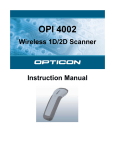
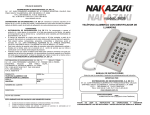

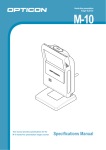
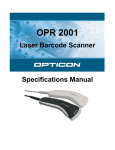
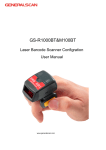
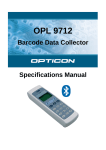
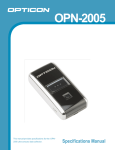
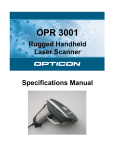
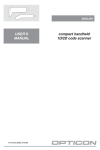
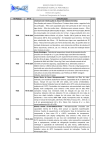
![Revista Eletrônica 159ª Edição - 03/09/2013 [0 Kb - PDF]](http://vs1.manualzilla.com/store/data/006079958_1-7036c174d98107fcf955a826430724cc-150x150.png)
